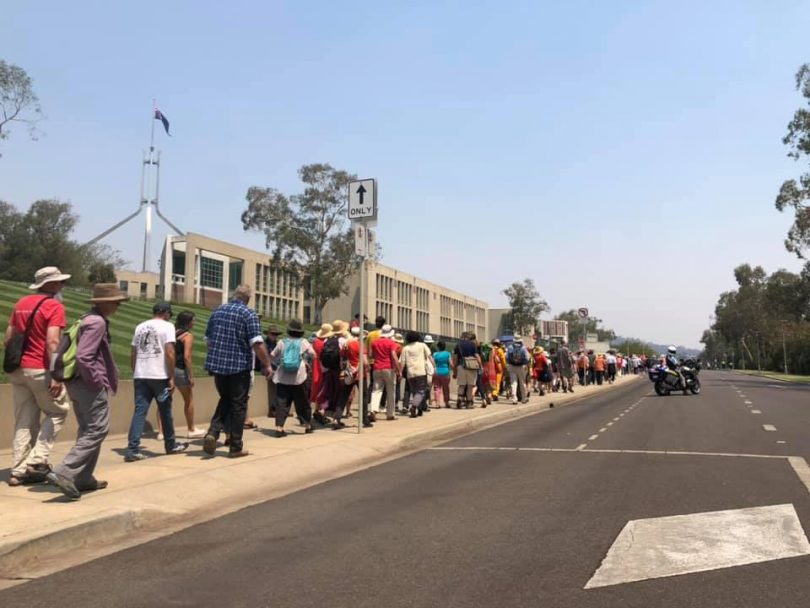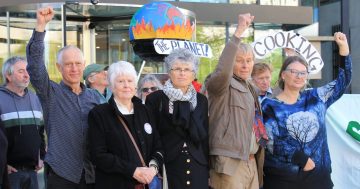
The People’s Climate Assembly at Parliament House on 4 February 2020. Photo: Facebook (The Peoples Climate Assembly).
Many people saw the coverage earlier this month of the People’s Climate Assembly protest, which coincided with the first parliamentary sitting week of the year. People from all over Australia converged on Canberra, including Indigenous leaders, to ensure their voices were heard.
But the People’s Climate Assembly was about more than protest. It was also a four-day climate gathering.
In a tent at the back of the Parliament House lawns, groups of people gathered to share knowledge and ideas while music such as Johnny Huckle’s songs, and activist artwork, flourished around them. The event included workshops on topics such as ‘How do we write humanity’s restoration story?’ and ‘Liveable cities and infrastructure’.
“Our democratic systems are not up to the task of confronting the climate crisis and are really ill-suited to enabling us to survive what’s coming,” Canberra resident, former federal Greens candidate and director of the Green Institute Tim Hollo said.
As someone who describes his work as being at the intersection of climate change and democracy, holding an event about democratic reinvention and the climate crisis on the Parliament House lawns held great appeal.
So when he first heard that the People’s Climate Assembly was being planned for Canberra, he got in touch with the organisers to put forward ideas about the workshops. Others joined in and before long a working group had formed to make it all happen.
The objective of the workshops was not to make decisions about what to do next. Instead, they were an opportunity to generate a national network of active, skilled citizens who are engaged in participatory democracy in their own communities.
“We wanted to bring people together from all over the country, give people a really good experience of what a deliberate participatory discussion is, how it works and how to facilitate it. Skilled up and ready to go back to their own communities and implement them there,” Mr Hollo said.
The discussions at the workshops were generated and directed by the participants, who came from a diversity of community, political, activist and academic groups. The ideas ranged from Indigenous justice to mental health to the arts to environmental custodianship practices.
“Our current system tells people that their role is to turn up to vote once every few years, then shut up and go home. You’re a consumer, not a citizen. Your voice is irrelevant at best, problematic and unwelcome at worst, and don’t protest,” Mr Hollo said.
He described the People’s Climate Assembly workshops as creating a framework for people to have conversations about how we want democracy to work and how we want our country to work.
“We want citizens to come together to determine our common future.”
He called for the flow of ideas to be reversed, so government serves the people rather than people being consumers of the government’s output of ideas.
“Democracy has been flipped such that it’s about government and industry, and citizens are an afterthought. It should be democracy for, by and of the people,” Mr Hollo said.
Emma Davidson is a candidate for the ACT Greens in the upcoming Territory election.
Do you think our system of democracy is able to respond to climate change?













